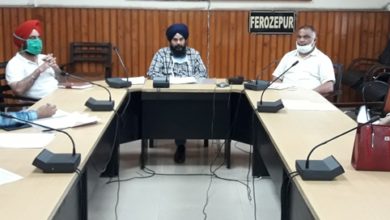World No Tobacco Day –Destroy the habit that destroys you.
World No Tobacco Day –Destroy the habit that destroys you.
Health Department teams challaned 111 for COPTA violations in Ferozepur
Ferozepur, May 31, 2016 : Giving impetus to anti-tobacco campaign in the state, the health department flagged off three teams by Dr.Jai Singh, Civil Surgeon, on World Tabacco Day celebrations, who challaned as many as 111 during two days – 30-31 May – in Ferozepur City and Cantt for violating – Regulation of Trade and Commerce Production, Supply and Distribution) Act (COPTA) for strengthening the public health measure at the district level.
It’s World No Tobacco Day today, an annual event that hopes to persuade people not to consume aany tobacco on that day and ideally forever.
Dr.G.P.Singla Asstt Civil Surgeon along with health department staff was also present on this occasion of celebrations of World No Tobacco Day celebrations at the district and block levels to create awareness among the people about the ill-effects of consuming tobacco with chronic diseases like Cancer.
Dr.Rajesh Bhaskar, District TB Officer informed that those consuming and selling the tobacco could be punished under the law apart from fine.
India is the second largest consumer of tobacco globally, and accounts for approximately one-sixth of the world’s tobacco-related deaths. It is estimated that around 1 million deaths a year in India are attributable to smoking. It is better to destroy the habit that destroys you, he added.
Also added here that Global adult tobacco survey 2009-10, by Ministry of Health and Family Welfare showed 12.5% population of Punjab as the smoking population, comprising less than 5% women population.
Global adult tobacco survey (2009-10, by Ministry of Health and Family Welfare, Govt. of India) suggests that in India, any form of tobacco use is prevalent in 34.6% adults – 47.9% in men and 20.3% in women. Every year about 1.5 lakh new cases of head and neck cancer and 70,000 new cases of lung cancer are reported in India (GLOBOCAN 2012); most of these are attributable to tobacco use.






